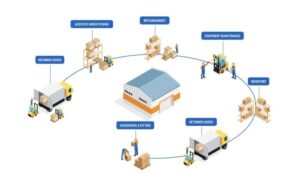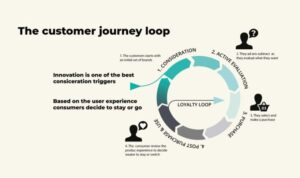Online Business Ideas pave the way for a new era of entrepreneurship in the digital realm, offering endless opportunities for innovation and growth. From e-commerce to influencer marketing, explore the dynamic landscape of online businesses and discover your path to success.
Overview of Online Business Ideas
In today’s digital landscape, online business ideas play a crucial role in the entrepreneurial world. These are innovative concepts that leverage the power of the internet to create and grow businesses in various industries.
Starting an online business comes with numerous benefits compared to a traditional brick-and-mortar setup. One major advantage is the ability to reach a global audience without the limitations of a physical location. Online businesses also have lower overhead costs, as there is no need for expensive rent or utilities.
Examples of Successful Online Businesses
- Amazon: The e-commerce giant revolutionized online shopping and set the standard for fast and efficient delivery services.
- Netflix: This streaming platform disrupted the entertainment industry and changed the way people consume TV shows and movies.
- Uber: The ride-hailing app transformed the transportation sector and introduced a new way of getting around in cities.
Popular Online Business Models

When it comes to online business models, there are several popular options that entrepreneurs can explore. Each model has its own set of pros and cons, which can impact the success of the business. Let’s take a closer look at some of the most common online business models: e-commerce, subscription services, affiliate marketing, and dropshipping.
E-commerce
E-commerce involves selling products or services online through a website or online marketplace. Customers make purchases directly from the website, and the business is responsible for processing orders, shipping products, and handling customer inquiries.
- Pros:
Wide reach and potential customer base
Ability to scale quickly
- Cons:
High competition
Need for inventory management
Example: Amazon, an e-commerce giant that offers a wide range of products and services to customers worldwide.
Subscription Services
Subscription services provide customers with access to products or services on a recurring basis in exchange for a subscription fee. These businesses often offer a more predictable revenue stream compared to one-time purchases.
- Pros:
Recurring revenue
Opportunity for customer retention
- Cons:
Need for continuous value delivery
Risk of customer churn
Example: Netflix, a popular streaming service that offers subscription-based access to movies and TV shows.
Affiliate Marketing
Affiliate marketing involves promoting products or services from other companies and earning a commission for each sale or lead generated through your referral. This model can be a low-risk way to earn passive income.
- Pros:
No need to create your own products
Potential for passive income
- Cons:
Dependence on affiliate programs
Commission rates may vary
Example: The Wirecutter, a product review website that earns commissions through affiliate links to products on e-commerce platforms.
Dropshipping
Dropshipping is a retail fulfillment method where a store doesn’t keep the products it sells in stock. Instead, when a store sells a product, it purchases the item from a third party and has it shipped directly to the customer.
- Pros:
No need for inventory management
Low upfront costs
- Cons:
Less control over shipping and quality
Thin profit margins
Example: Shopify, a platform that enables entrepreneurs to set up dropshipping stores and sell products online without holding inventory.
Emerging Trends in Online Business: Online Business Ideas

In the fast-paced world of online business, new trends are constantly shaping the landscape. From social commerce to influencer marketing, and advancements in technology like AI and blockchain, the future of online businesses is ever-evolving. Let’s dive into some of the emerging trends that are making waves in the digital business world.
Social Commerce
Social commerce is the fusion of social media and e-commerce, allowing users to purchase products directly through social platforms. This trend is revolutionizing the way businesses interact with customers, leveraging the power of social networks to drive sales and engagement.
Influencer Marketing
Influencer marketing has become a prominent strategy for online businesses to reach their target audience through trusted individuals with a strong social media following. By collaborating with influencers, businesses can tap into a more authentic and personalized way of advertising products and services.
Voice Commerce
Voice commerce, powered by technologies like Amazon’s Alexa and Google Assistant, is on the rise. Consumers can now shop and make purchases using voice commands, making the shopping experience more convenient and seamless. This trend is set to reshape the way people interact with online businesses in the future.
Impact of Emerging Technologies
Technologies like Artificial Intelligence (AI), blockchain, and Augmented Reality/Virtual Reality (AR/VR) are playing a significant role in shaping the future of online businesses. AI is being used for personalized recommendations and chatbots, blockchain is enhancing security and transparency in transactions, while AR/VR are creating immersive shopping experiences for customers.
Changing Consumer Behaviors, Online Business Ideas
Consumer behaviors are constantly evolving, influenced by factors like convenience, personalization, and sustainability. Online businesses need to adapt to these changing behaviors by offering seamless shopping experiences, personalized recommendations, and eco-friendly products and services to cater to the demands of the modern consumer.
Steps to Start an Online Business
Starting an online business can be an exciting journey, but it requires careful planning and execution to be successful. Here is a step-by-step guide on how to start an online business from idea generation to launch.
Choose the Right Niche
Before diving into starting your online business, it’s essential to choose the right niche. Consider your interests, expertise, and target market to narrow down your options.
- Research market trends and competition in your chosen niche.
- Identify a unique selling proposition that sets you apart from competitors.
- Ensure there is demand for your products or services in the market.
Set Up a Website
Once you have identified your niche, the next step is to set up a professional website to showcase your products or services. Your website is the online storefront of your business, so make sure it’s user-friendly and visually appealing.
- Choose a domain name that reflects your brand and is easy to remember.
- Select a reliable web hosting service to ensure your website is always accessible.
- Create high-quality content and optimize your website for search engines to attract organic traffic.
Implement Marketing Strategies
Marketing is crucial for the success of your online business. Develop a comprehensive marketing strategy to reach your target audience and drive sales.
- Utilize social media platforms to engage with your audience and promote your products or services.
- Invest in paid advertising campaigns to increase visibility and generate leads.
- Implement email marketing campaigns to nurture relationships with customers and encourage repeat purchases.
Focus on Customer Acquisition
Acquiring customers is key to growing your online business. Develop strategies to attract and retain customers to ensure long-term success.
- Offer exceptional customer service to build trust and loyalty with your audience.
- Collect feedback from customers to improve your products or services continuously.
- Provide incentives such as discounts or loyalty programs to encourage repeat business.





